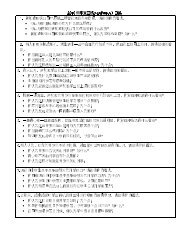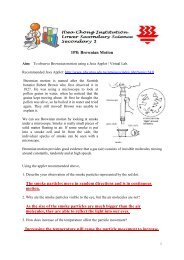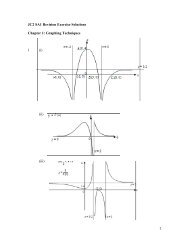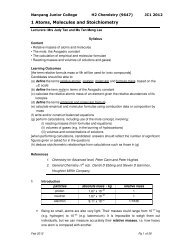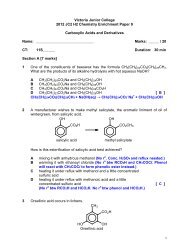Suggested Answers of BT2 Revision Package - ASKnLearn
Suggested Answers of BT2 Revision Package - ASKnLearn
Suggested Answers of BT2 Revision Package - ASKnLearn
- No tags were found...
You also want an ePaper? Increase the reach of your titles
YUMPU automatically turns print PDFs into web optimized ePapers that Google loves.
Domestic firms are larger and likely more productive efficient due to IEOS. Free movement <strong>of</strong> goods and services makes available more export markets to them. Their firms are more able to penetrate markets <strong>of</strong> small and open economies more effectively for greater pr<strong>of</strong>it, which when remitted improves BOPCA. Eg, Many MNCs are from countries that are large and less open as the large domestic market enables their expansion. Evaluation:• Small and open economies have more to gain because globalisation can help them circumvent the limitations imposed by their small domestic markets in achieving their macroeconomic objectives. This is because globalisation enables them to trade with the world, attract foreign workers and FDI. Such limitations are faced by large and less open economies to a smaller extent. • Given the problems brought about by globalisation, small open economies need to be able to mitigate its costs in order to ensure that they benefit: o Need to assert greater control over their external environment – through exchange rate policies. This requires them to build up sizeable reserves to manage their exchange rate for better stability. o Signing FTAs with a larger number <strong>of</strong> countries to reduce the risk <strong>of</strong> external fluctuations. L3 For a well-developed answer that explains and illustrates the benefits andcosts <strong>of</strong> globalisation to small and open and large and compares them with(7-9m)less open economies using clear economic frameworks.L2(5-6m)L1(1-4m)E2(3-4m)E1(1-2m)• Answer contains a range <strong>of</strong> arguments spanning all 3 facets <strong>of</strong> globalisation: Free movement <strong>of</strong> (i) goods and services (ii) labour (iii) capital and technology. • Contains only minor misconceptions. For an under-developed answer that explains and illustrates the benefits andcosts <strong>of</strong> globalisation to small and open and large and less open economies.• Max 5m if answer does not compare the benefits accruable to small and open economies viz big and less open economies. • Max 5m for an unbalanced answer. • Max 5m for an answer that touches only on the trade facet <strong>of</strong> globalisation. • Max 5m if no clear economic framework is presented. For an undeveloped answer that merely shows knowledge <strong>of</strong> globalisationand/or its benefits and costs.• Answer contains severe misconceptions. Economic judgement with justification using clear economic framework.Candidates need to present their own opinion backed up by economictheories.Economic judgement with justification but lacking in economic reasoning. Amere presentation <strong>of</strong> personal opinions without substantiation usingeconomic theories.






